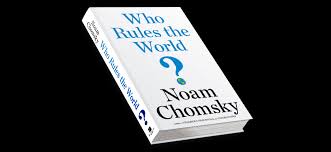As usual, Norm Chomsky makes us rethink what we often lazily take for granted. He poses the question, “Who Rules the World” and immediately refutes what is probably our most common answer. That quick, assumptive response is often “the states” or “the great powers”, but he says this may be misleading. Regardless of the level of supposed democracy, decisions and politics “are heavily influenced by internal concentrations of power, while the general population is often marginalized”. Chomsky emphasizes that, to understand who rules the world, we cannot ignore the “’masters of mankind,’ as Adam Smith called them: in his day, the merchants and manufacturers of England; in ours, multinational conglomerates, huge financial institutions, retail empires, and the like.” Basically what we know as multinational corporations. He describes “the ‘vile maxim’ to which the “masters of mankind” are dedicated: ‘All for ourselves and nothing for other people’. This doctrine or policy is intricately entwined with ‘class war, often one-sided, much to the detriment of the people of the … the world’.”
In the two articles below found in The Nation magazine, Chomsky makes many points clarifying policies and tools used by “the masters (to) hold enormous power”. Protecting their power is a constant effort. Laws need to be written, treaties created, etc. Many if not most of these “are negotiated in secret, … (except) the hundreds of corporate lawyers and lobbyists writing the crucial details.” A recent example glaring at us as “we consider the role of the masters of mankind, we turn to such state policy priorities of the moment as the Trans-Pacific Partnership, one of the investor-rights agreements mislabeled ‘free-trade agreements’ in propaganda and commentary.”
Worldwide fascination with neoliberalism has “concentrated wealth and power in far fewer hands while undermining functioning democracy”. Everywhere people are reaching to left or right extremes, as we see in the US with the rise of Trump and Sanders. There is “a mood of angry impotence as the real power to shape events largely shifted from national political leaders [who, in principle at least, are subject to democratic politics] to the market, the institutions of the European Union and corporations.” The public has become irrelevant as it struggles to “accept the approved role of ‘spectators’ (rather than ‘participants’) assigned to it in liberal democratic theory.”
To all this, democracy demands action for it’s very survival. Chomsky provides a range of historical perspectives from figures such as George Washington, William Polk and the G.W. Bush administration and international crises often originating or exacerbated by the Bush administration. In international situations Chomsky points out that the US “does not tolerate what is officially called ‘successful defiance’ of the Monroe Doctrine of 1823, which declared (but could not yet implement) US control of the hemisphere. And a small country that carries out such successful defiance may be subjected to “the terrors of the earth” and a crushing embargo—as happened to Cuba.” And other hemispheres are not treated very differently. Bush gave the world the “Global War on Terror (GWOT)”, along with it’s own new and historical ways of dealing with inequality and now religion. Chomsky explore the “Challenge Today: The Muslim World” in much more detail.
Returning to the question “Who rules the world?” Chomsky suggests “we might also want to pose another question: ‘What principles and values rule the world?'” My thoughts keep going back to today’s “masters of mankind” (multinational conglomerates, huge financial institutions, retail empires) or multi national corporations. There is one thing we in the US could do to seriously reduce the concentration of corporate power. That would be to amend the constitution, stating once and for all that “corporations are not people” and “money is not speech”. The “We The People Amendment“, by the coalition Move to Amend, would do just that.
There is a lot in these two articles and reading them would truly be time well spent.
